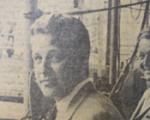Entertaining eschatology. Tickets for Mommy Polish avant-garde plays at the School of Dramatic Art
At school dramatic art» play the Polish avant-garde ( Theatrical, 01/06/2017).
Mommy. School of Dramatic Art. Press about the play
Theatrical , January 6, 2017
Natalia Shainyan
Entertaining eschatology
Polish avant-garde plays at the School of Dramatic Art
"Mommy" - new performance based on the play by Stanislav Vitkevich "Mother", staged at the ShDI. Director Elena Nevezhina turned to the work, which for some reason the directors ignore.
The author, who called himself Witkacy, is a Polish avant-garde artist with an aristocratic upbringing, talents for painting and literature, who survived the suicide of the bride, the trenches of the First World War, the October coup in Petrograd, experimented with drugs, eros, word, reality and attempts to go beyond it, committed suicide during the Soviet invasion of Poland. Forgotten and forbidden, out of touch with his time and incredibly sensitive to it, defining the search in Polish art of the next decades, this man, to whom complete definitions can hardly be applied, was a hoaxer and provocateur who fled mediocrity like the plague. According to Witkevich, theater is not what takes place on the stage, but what happens in the soul of the viewer.
Production designer Dmitry Razumov set up a long white table along the backdrop, cluttered with bottles - wedding or funeral, it doesn’t matter, no one will sit at the table. In front of him, on the side, is a deathbed, lavishly adorned with skeins of colored wool. The deceased is a mannequin, drowning in them, as in flowers, “Where the table was food, there is a coffin” - the situation is literally embodied. A mirror club ball is spinning above this funeral feast. The central tablet of the stage is occupied by a diamond-shaped shiny podium, all covered in flashing light bulbs - the characters come out there, showing off, one by one.
Here Leon sparkles with a briolin parting and a crazy eye - a handsome man, an erotomaniac, a drug addict and a vampire - something like this is how he certifies himself. The main events in his life are the death of his mother and his encounter with cocaine. Mammy appears next - whitewashed, in a luxurious outfit, she is not at all embarrassed by her not quite alive position and participates in the action in the solo part - after all, our dead never truly leave, they continue to live and communicate with us in our minds. The action from the very beginning unfolds in the presence of death, and this memento mori manifests itself in the most common and pagan way in all subsequent moments - love, high, rage, ecstasy, hopelessness.
However, there is just no question of clarity of consciousness, as well as clear boundaries between dream and reality, delirium and reason, reality and phantasmagoria. Everything is illogical, shifted in this world that looks like a cafe-chantan - the imposing dead daddy - the old seigneur with a huge broken wing, and the more than lively sarcastic maid Dorota, and the young beauty Zosya, Leon's wife, and his the exalted mistress of Lucina, and a couple of mannered lovers Zosia, and even the director of the theater, who is a woman in disguise, and this is not at all strange in the general confusion. For the exuberant and exquisite beauty of the outfits, I would like to separately thank the artist Vadim Andreev.
The viewer freezes in front of what is happening before his eyes, after trying to find the logic in what is happening, he surrenders to the mercy of these vampires, who rule the ball here, and listens with sympathy to the verses of Russian poets in their performance Silver Age- I understood this century in confusion, and in cocaine, and in despair. The word “love” turns out to be the most worn out here - from private use to the place and not to the place, it completely washed out and became an annoying vignette in discussions about, for example, how the world is doomed or where to get the drug.
Roman Dolgushin plays his Leon with cheerful courage, draping his piercing eschatological mood - how else can you rush into the hall, cut through the spectator rows, excitedly carrying a huge monologue of incredible complexity about a person dying under the hegemony of society, about the metaphysical exit of mankind from civilization he composed dead end. Heaps of periods, swirls of political terms and mystical jargon - all this he throws handfuls into the hall, as if drowning it in his madness, and looks convincing in it, like a true madman or a dervish at the descent of the spirit. The utopianism of his idea of everyone’s own spiritual effort, his apology of the individual in front of the impending depersonalizing mass sounds especially poignant through the prism of time, a century that divided the time of writing and performing this monologue and crushed the individual with all tanks, decrees and repressions.
Mom - Lyudmila Drebneva, looks surprisingly healthy and calm. She is full of strength and dignity, despite the pitiful content of her speeches - by knitting she barely earns the maintenance of her dissolute son, who draws the last juices out of her, like a true vampire. Her dialogues with Dorota, who lost her son in the war, sound like a grotesque, caustic, cynical shootout, but do not answer the most bitter question for them: what is easier for a mother - to see her son dead or not as she wanted? The son who hung like a stone on his mother's neck and brought her to the grave - her misfortune or her fault? To what extent are the elders responsible for what befell their children and what they failed to cope with? The actress, as well as the director, do not give an answer to these questions, but give a feeling of the constant presence of the mother in son's life, acceptance, forgiveness, comfort, stroking touch - and this is almost more than any answer.
Zosya and Lutsina embody two types of female love - predatory, carnal, greedy and shamelessly innocent in their very depravity; and exalted, dumb, epileptic and exhaustingly lyrical. The bright and temperamental Regina Khakimova here competes for the attention of the audience with the fragile Olga Bondareva, and both of them are ready to tear apart Leon, who does not want to give up any pleasures. Everyone’s nerves are on edge, the feeling of a cliff and a grave gap is becoming more and more pronounced, and the only thing that none of the pitiful, smart, stupid, powerless, cynical, bestially selfish, impulsive, desperately clinging to each other and trampling each other characters is categorically capable of - it's something to do. Avoiding boredom by all legal and illegal means, they remain impeccably inactive. Even Mammy doesn't knit, apparently to avoid a very complete resemblance to moira spinning fate.
These merry ghosts in the final make a real dance macabra. Twitching in a rhythmic dance, almost rattling their bones, they finally immerse the viewer, who has long lost the thread of the story, into a kind of trance. The game is the most powerful drug, it was in his work that Witkacy felt the maximum intensity of being and encoded in his plays this absurd, grotesque, escheat world, mysteriously affecting the mind of the viewer, involving him in the experience of death, despair, fun and beauty, which in any moment are reflections of each other. The courageous attempt of Elena Nevezhina to decipher the codes of the Polish avant-garde artist is a new interesting experience both for her, and for the SDI troupe, and for the viewer.
The play of the Polish writer, artist and philosopher, the forefather of the theater of the absurd, Stanislav Vitkevich "Mamula" is presented for the first time on the Moscow stage.
"Mammy" by Stanislav Vitkevich - family drama in the mirror of the grotesque and black humor of metaphysical proportions. Yanina and her son Leon live in a contradictory union, where it is impossible to distinguish between self-sacrifice and slavery, the bite of a vampire from a kiss, love from pride; and in terms of philosophical and cultural - utopia from anti-utopia, rebirth from degeneration. Yanina exhausts her last strength for the sake of her son-sage - a seeker of philosophical keys to the door of the future. However, how to achieve the integrity of the idea and its author? Will there ever be a correspondence between the scale of thought and the scale of human personality? Will the cycle of creation turn into a cycle of destruction? Vitkevich's drama strives to find an answer.
Witkevich was infected with the idea of penetrating into the mystery of being. In the world of his day, he keenly felt the “crack of being,” through which metaphysics leaves life.”
- Elena Nevezhina, director.
The play Mamula will tell a very relevant story about the conflicting love of a mother for her son. The mother of the young philosopher was practically exhausted from his utopian ideas about finding doors to the future. Therefore, in their relationship, love is combined with narcissism, self-sacrifice and slavery. But also in this story it is almost impossible to distinguish utopia from dystopia, rebirth from degeneration. How will this story end? Can the characters find a match between thought and personality? Will creation lead to destruction?
This performance was created by famous play the famous Polish philosopher, artist and writer Stanislav Witkevich, who is one of the first ideologists of the absurd in this country. This work, full of grotesque and black humor, was written by him in 1924. It seeks to tell us the secret of being. In addition, this is a philosophical story about the search for spirituality at a time when the entire society is spiritually exhausted. But is it possible to find it in such difficult times? And is it a problem of one family taken or of the whole world? Answers to all these questions can be found for everyone who wants to order tickets for the play Mamul.
Despite the fact that this work has long been widely known all over the world, in our country it has not been staged before. theater stage. And only this season, the capital's audience will be able to see the premiere of this very relevant performance in our time. After all, despite the fact that the play was written almost a century ago, it still seems quite modern to us today. Today's society is far from ideal. This affects not only individual families but also all the people. And getting out of this vicious circle is very difficult. This is the task of the whole society, and at the same time, of each of its representatives.




